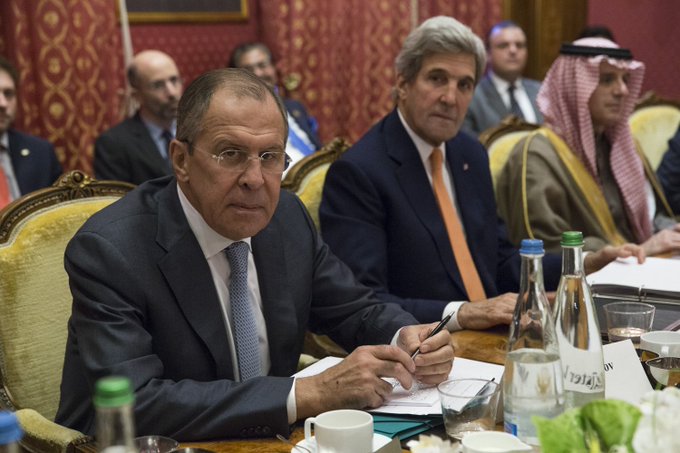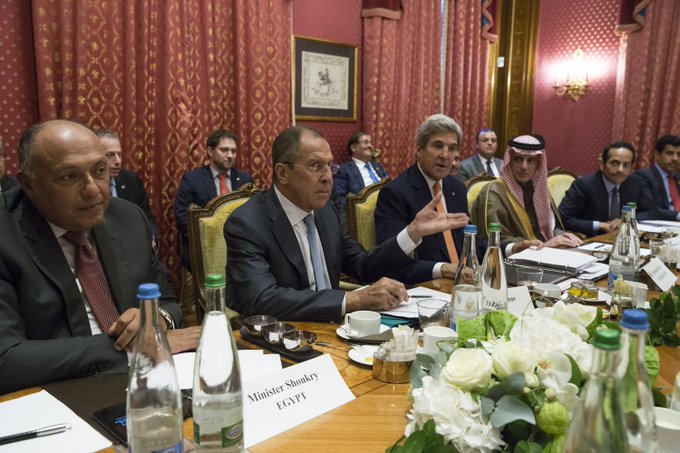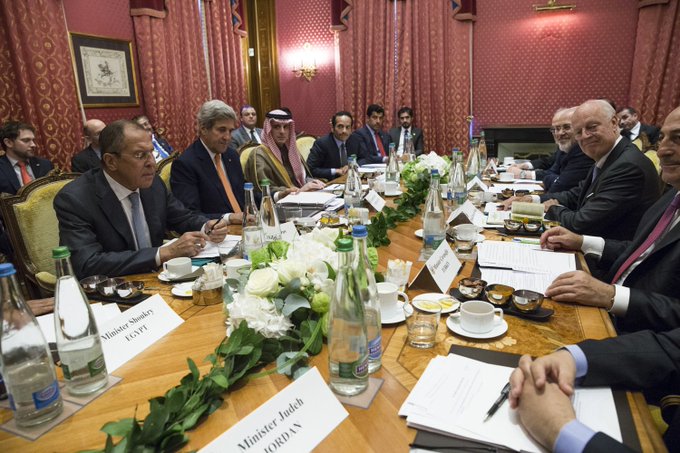Kerry’s on-off talks go nowhere while Syria, Russia get on with winning the war
Finian Cunningham (born 1963) has written extensively on international affairs, with articles published in several languages. Originally from Belfast, Ireland, he is a Master’s graduate in Agricultural Chemistry and worked as a scientific editor for the Royal Society of Chemistry, Cambridge, England, before pursuing a career in newspaper journalism. For over 20 years he worked as an editor and writer in major news media organizations, including The Mirror, Irish Times and Independent. Now a freelance journalist based in East Africa, his columns appear on RT, Sputnik, Strategic Culture Foundation and Press TV.
Having abruptly broken off bilateral relations last week with Russia, Washington had to save face by re-engaging with Moscow this weekend in a 'multi-lateral' format.
It was noticeable that as foreign ministers of seven Mideast countries held talks in the Swiss city of Lausanne on the Syrian conflict, the two main players were US Secretary of State John Kerry and Russian counterpart Sergey Lavrov.
Kerry had convened the meeting and it was clear to observers that talking with his Russian guest was Kerry’s primary intention. The two men held separate preliminary discussions, before being joined later by diplomats from Egypt, Iran, Iraq, Jordan, Qatar, Saudi Arabia and Turkey.
Since the ceasefire pact worked out last month by Kerry and Lavrov collapsed during the final week of September, there has been a frenzied campaign of recriminations conducted by Washington and its allies against Russia.
Kerry has even called for Russia to be investigated for war crimes over its renewed military operations in the battleground city of Aleppo, where the Russian air force is providing crucial support to the Syrian army. The provocative claims have been echoed by French and British leaders, with Britain’s foreign secretary Boris Johnson going as far as demanding public protests outside the Russian embassy – an agitprop that has been ignored by Britons.
Washington and its allies have accused Russian and Syrian forces of targeting civilian centers and hospitals in the eastern part of Aleppo, which has been under siege by anti-government militants for nearly four years. The Western media have amplified these claims without question, which are largely based on unverified “activist” sources from within east Aleppo, even though there are good grounds to suspect that these sources are dubious and indeed linked to terror groups.
In any case, Russia and Syria have rejected Western allegations of war crimes. They say that they are simply exercising the sovereign right to take back control of Syria’s second city from 8,000 illegally armed insurgents. The insurgents are mainly dominated by the internationally proscribed terror group, Jabhat al Nusra (renamed Jabhat al Fatah al Sham), which is holding much of the 275,000 civilian population as hostages and human shields.
To bolster its agenda of portraying Russia as a pariah state, Washington declared last week that Kerry would no longer be holding bilateral talks with Lavrov. Menacingly, the Americans said they would henceforth be exploring “non-diplomatic options” and began dropping heavy hints in the media that supplying anti-aircraft missiles to the militants was one of those options.
Another objective being pushed is the setting up of no-fly zones around Aleppo, which Russia has firmly resisted, saying that such an initiative contravenes Syrian sovereignty and would in effect provide air cover for terror groups to marshal their units.
But despite all the blustering rhetoric condemning Russia, there was no concealing John Kerry’s keenness to re-engage with Lavrov when the pair met up this weekend at Lake Geneva. There is something incongruous, or perhaps disingenuous, in Kerry hosting his Russian counterpart with such relish after a relentless US-orchestrated media campaign over the past three weeks aimed at demonizing Russia as a war criminal over Syria.
Evidently, Washington needs Moscow to pursue its interests in Syria, as its zig-zagging caprice suggests.
While the diplomats were enjoying five-star hotel comforts, Syrian and Russian forces pushed on with the task of winning the nearly six-year war. The Syrian army reportedly made major advances on eastern Aleppo this weekend, winning control of important central districts which will further loosen the siege by the militants.
UN special envoy to Syria, Staffan de Mistura, has said that eastern Aleppo will be destroyed by Christmas. This is just a pejorative way of saying the whole city will have been liberated by the Syrian army and allied Russian forces.
The situation facing the foreign-backed militants is critical. If they are vanquished in Syria, then that spells the end of the entire Syrian conflict, which has been a US-led covert war for regime change against a strategic Russian ally.
That seems to be why Washington and its allies have become so angst-driven since the ceasefire broke down. They are trying to salvage their regime-change project in Syria, which Russia’s military intervention at the end of last year largely reversed.
The almost-hysterical denunciations issued by Washington, London and Paris over alleged “war crimes” have got nothing to do with concern for humanitarian suffering. The real, unspoken and only concern is that the foreign-backed mercenary army in Syria is facing a pivotal defeat in Aleppo.
No doubt Kerry still clings to the vain hope that he can somehow get Moscow to influence the Syrian government of President Bashar al Assad. In particular, to get Syria to ground its air force and unilaterally halt its military campaign for“humanitarian reasons”.
Russia is having none of it. This weekend Lavrov emphasized that the lodestar for any ceasefire to be feasible depends on militant groups dissociating from proscribed terrorist organizations. The failure to make any separation was the main reason why the ceasefire collapsed last month.
Russia is right to insist on this. Because the lack of any putative separation of militants into so-called “moderates” and“extremists” proves the argument that the Syrian conflict has been driven by illegally armed insurgents. In short, a terrorist proxy army.
And what has been proven in recent weeks beyond any doubt is that Washington and its allies are the sponsors of this terrorist proxy army.
Russia knows the real nature of Washington’s criminal involvement in Syria’s conflict. Lavrov has been calling Washington out in blunt terms of late, saying that it has been covertly supporting Al Qaeda-affiliated Jabhat al Nusra from the outset. It doesn’t come more stark than that assessment. Washington colluding with terrorists, as declared by Russia’s top diplomat.
Sitting around the negotiating table in Lausanne were representatives of countries that Moscow knows full well have conspired with Washington to destroy Syria, primarily Turkey, Saudi Arabia and Qatar. Kerry’s next stop is London where he will meet with diplomats from Britain and France, two other criminal, terrorist-sponsoring co-conspirators.
Russia’s military intervention in Syria and its deft diplomacy have together had a cathartic transformation on the conflict. Militarily, a victory can be envisaged for the Syrian nation against a foreign plot to subjugate it. Secondly, Sergey Lavrov’s painstaking negotiations over the past year have had the revelatory effect of exposing the hitherto covert, nefarious role of Washington and its allies in fueling the Syrian war.
Given the reality now made manifest, there seems little else to talk about. Talks about ceasefires and political transition have an air of futility. The most effective way to bring peace to Syria is for the Syrian and Russian forces to redouble their determination to crush the insurgency.
If Washington and its allies somehow develop a genuine concern to end the war, then they can easily contribute by stopping their covert money and arms supplies to their terrorist proxy army.
When Kerry meets his fellow war criminals in London to give them a briefing from Lausanne, the bottomline will be: Sorry guys, the Russians aren’t buying our bluff anymore.
The statements, views and opinions expressed in this column are solely those of the author and do not necessarily represent those of RT.
https://www.rt.com/op-edge/362940-kerry-lavrov-russia-syria/





0 Comments:
Post a Comment
Subscribe to Post Comments [Atom]
<< Home